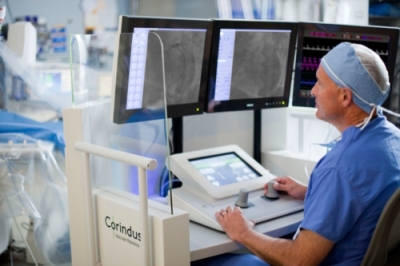Oct 19 2012
Corindus Vascular Robotics, a developer of precision vascular robotics, today announced leading experts in interventional cardiology will speak about their clinical experience using the CorPath® 200 System at this year's Transcatheter Cardiovascular Therapeutics' annual meeting, TCT 2012.
 The CorPath 200 System is the first FDA-cleared technology to allow for robotic-assisted percutaneous coronary interventions (PCI), a procedure to restore blood flow to blocked arteries in patients with coronary artery disease (CAD). (PRNewsFoto/Corindus Vascular Robotics)
The CorPath 200 System is the first FDA-cleared technology to allow for robotic-assisted percutaneous coronary interventions (PCI), a procedure to restore blood flow to blocked arteries in patients with coronary artery disease (CAD). (PRNewsFoto/Corindus Vascular Robotics)
As part of TCT's scientific symposia "Interventional Innovation: Novel Therapies and the "Best" New Device Concepts for 2012," Giora Weisz, M.D., director of Clinical Research at the Center for Interventional Vascular Therapy at NewYork-Presbyterian Hospital/Columbia University Medical Center and associate professor of Medicine at Columbia University College of Physicians and Surgeons, New York will present a taped case and discussion titled "The Corindus Robotic-Assisted Coronary Angioplasty System."
"Robotic-assisted PCI's will revolutionize the way interventional cardiologists perform the procedure," said Dr. Weisz. "The case presentation will highlight my clinical use of the CorPath 200 System and how — in my experience — robotic-assisted PCI is safe and provides enhanced precision and control of the guidewire, balloon and stent. Additionally, sitting comfortably during the procedure, without the need for a lead apron and in proximity to the monitors, allows me to improve visualization of the treatment targets. Improved measurement and visualization is important as 10-20 percent of patients require a second stent due to inaccurate placement or size of the first stent."
Additionally, Corindus Vascular Robotics and Philips Healthcare will co-sponsor a symposium, "Introducing Robotic-Assisted PCI into Your Cath Lab Practice." The event will take place on Thursday, October 25 at 7:00 a.m. EDT at the Miami Beach Convention Center. Moderated by Peter J. Fitzgerald, M.D., Stanford University and Dr. Weisz, the symposium will include presentations on the benefits of robotic-assisted percutaneous coronary intervention (PCI) procedures, followed by a roundtable discussion. Presentations include:
- "CorPath 200 System Overview-Robotic-assisted PCI" – George Vetrovec, M.D., VCU Medical Center
- "The PRECISE Final Results" – Giora Weisz, M.D., NewYork-Presbyterian Hospital/Columbia University Medical Center
- "A Day in a CorPath Lab: Treating Different Patients with a Robotic System" – J. Jeffrey Marshall, M.D., FACC, FSCAI, North East Georgia Medical Center
- "Robotics in the Cath Lab: Hospital's Perspective" – Joseph P. Carrozza Jr., M.D., Steward St. Elizabeth's Medical Center and Tufts University Medical School
"Receiving FDA clearance earlier this year for the CorPath 200 System, TCT 2012 marks an exciting opportunity to educate interventional cardiologists not only about the benefits of the CorPath 200 System, but its use in clinical practice," said David Handler, CEO of Corindus Vascular Robotics. "Several leading medical centers have already adopted the CorPath 200 System to enhance their hospital's cardiology programs. The adoption and excitement for the technology further solidifies our belief that the CorPath will change standard of care, and improve safety and the quality of care in the cath lab."